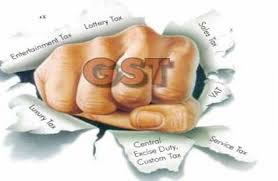In a flurry of GST related announcements, there came some reliefs for the stock markets. The definition of “goods” under the Goods & Services Tax Law has been redrafted to exclude “securities”.
The revised drafts of the Model GST Law, Integrated GST Law and GST Compensation Law were released on Saturday. The Bills are now scheduled to be taken up by the GST Council on December 2 and 3. If passed, the government would be able to introduce GST from the targeted date of April 1, 2017. State GST Bills would have to be passed by respective state Assemblies.
Consequently, the redrafted Section 2(49) defines “goods’’ as every kind of movable property other than money and securities. The previous draft of the Model GST bill had included ‘securities’ in the definition of goods. This had raised concerns on whether transactions in securities would attract GST.
Some key changes in the revised drafts are:
- Concept of ‘anti-profiteering’ has been brought into picture. A measure has been proposed to ensure that trade and industry pass the benefits of reduction in tax rates to consumers. An anti-profiteering authority is proposed to be set up as vigilance authority.
- Concept of “mixed” and “composite” goods introduced. “Mixed” goods mean a seller may give different goods to a buyer, without a dominant price. That is to say, when availing a combination of goods (where each good attracts a different tax rate), the GST payable shall be highest of them all.
- Concept of “composite” of goods, where one dominant good is sold. This is applied in case of joint products. For example, when a buyer buys a laptop and gets a laptop bag free. The laptop is subject to a certain tax rate and the bag to a different tax rate. In such cases, the tax rate of the primary/dominant product shall be attracted. That is to say, with respect to this example, the tax rate of the laptop would be applicable.
- Removal of provision of intangibles as services. As per the initial model bill, intangibles were taken as services. This provision has been done away with. This is successfully expected to remove confusions that arose with respect to specific intangibles like software.
- Input-tax reimbursements can be claimed over a period of three years for goods such as telecom towers and pipelines.
- Formulation of a separate compensation bill (draft). The Bill says that a tax revenue growth rate of 14 per cent would be assumed for states with the base year of 2015-16. The Centre will give full compensation to states in case of revenue loss because of GST for the first five years of the introduction of the new indirect tax system. This would be given at the end of every quarter, says the draft Bill.
Keep watching this space for more updates!
 customersuccess@taxmantra.com
customersuccess@taxmantra.com Toll Free:
Toll Free:  Contact Us
Contact Us


